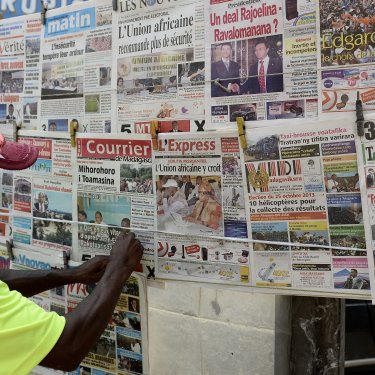RSF calls on Madagascar to stop censoring media

Reporters Without Borders (RSF) calls on the authorities in Madagascar not to censor the media in the run-up to next month’s presidential election, after they prevented a magazine from publishing an opinion poll and closed a radio station.
Which of the 36 presidential candidates is the front-runner in the first round of the election scheduled for 7 November? Madagascans don’t know because Politikà, a news biweekly funded by Germany’s Friedrich Ebert Foundation, was prevented from publishing the results of the poll it commissioned.
In a letter to the German embassy, Madagascar’s foreign minister expressed “deep concern about the publication of figures or opinion polls” and referred to the need to “safeguard public order and state security.”
The magazine’s editor, Raoto Andriamanambe, told RSF that, as a result of the pressure, he ripped the pages containing the results of the poll out of the issue on the eve of its publication on 26 September.
A few days later, another letter, this time from the communication ministry, was sent to Hawel Mamodaly, an opposition parliamentarian, ordering him to close Fréquence Menabe, the local radio station he owns in Morondava, 650 km west of the capital.
The authorities claimed that the station, which is very popular in the region, had incited unrest by allowing a local resident to issue a call on the air for a protest against a court’s decision to provisionally release two alleged cattle thieves. Other media outlets reported the same news without being closed.
“Preventing the publication of a poll and arbitrarily closing a radio station owned by an opposition legislator in the run-up to a presidential election constitute acts of censorship prejudicial to the quality of the democratic debate,”said Arnaud Froger, the head of RSF’s Africa desk. “Journalistic freedom is essential for fair and transparent elections.”
Relations between the Madagascan authorities and journalists have often been tense under President Hery Rajaonarimampianina, who is running for another term. Shortly after his election in 2013, he warned journalists that there were “limits” to press freedom. His prime minister meanwhile urged reporters not to ask the president “bothersome questions.”
In 2016, RSF condemned the adoption of a communication code based on the criminal code, under which press offences are punishable by imprisonment. RSF also worked to obtain the provisional release of Radio Jupiterdirector Fernand Cello, who ended up being given a suspended two-year jail sentence in connection with his investigative coverage of corruption and abuse of authority in the south of the country.
Madagascar is ranked 54th out of 180 countries in RSF’s 2018 World Press Freedom Index.



